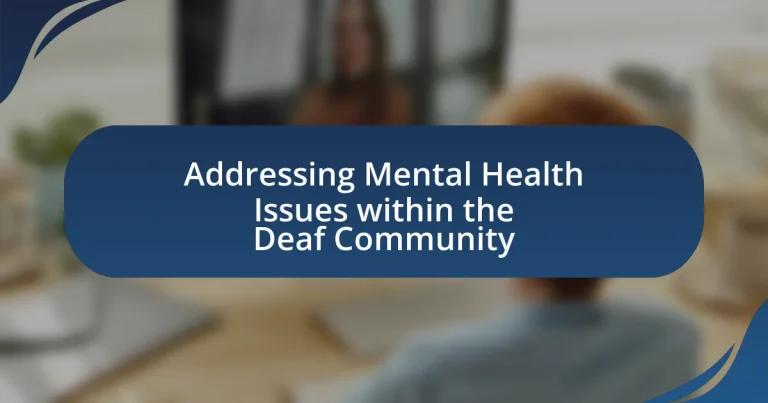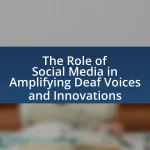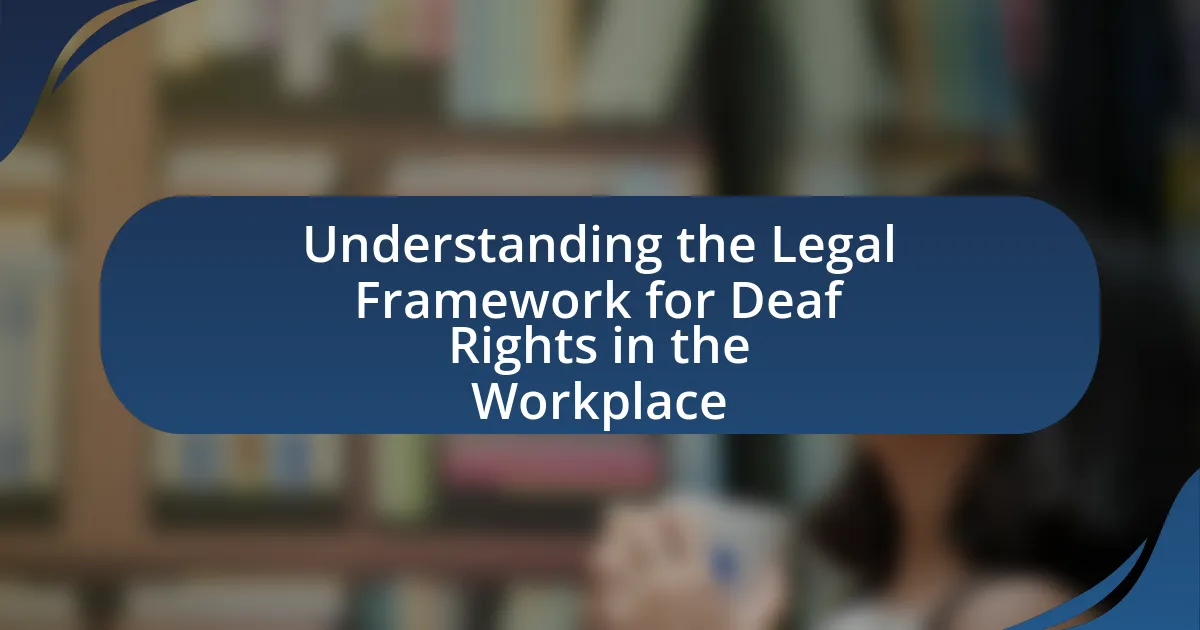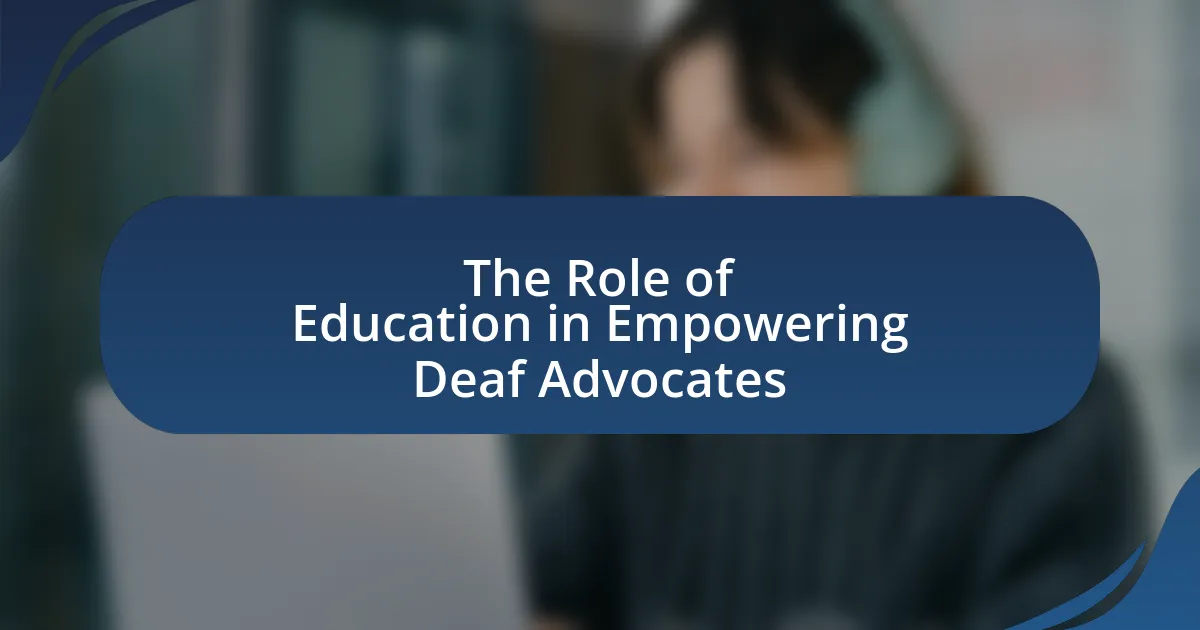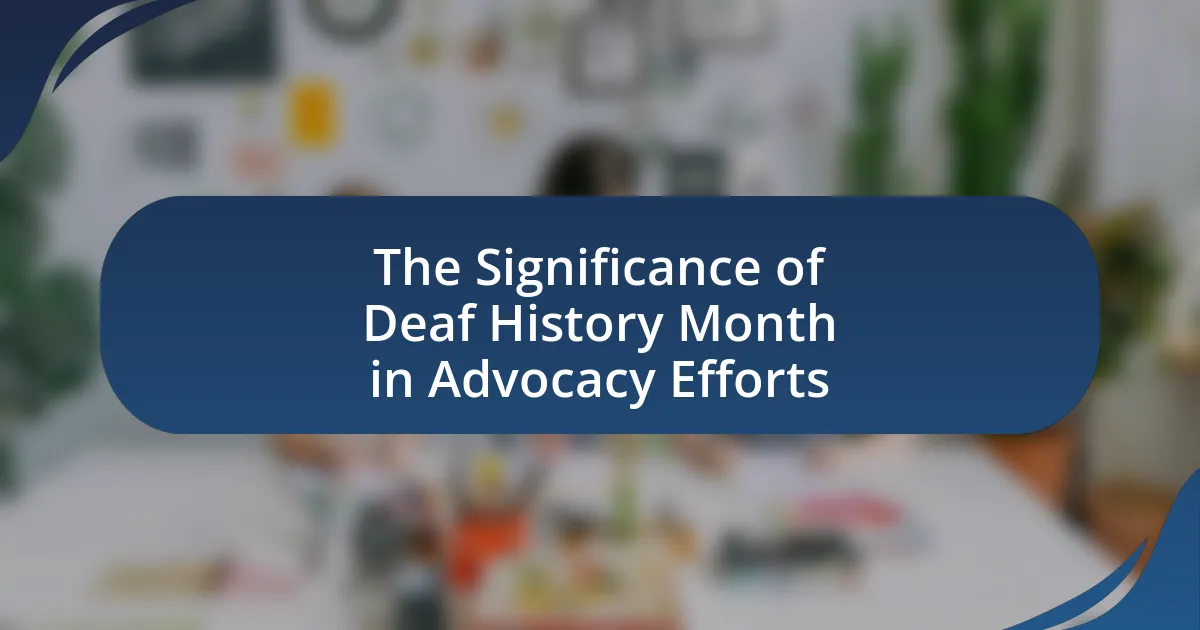The article addresses the mental health issues faced by the Deaf community, highlighting unique challenges such as communication barriers, social isolation, and stigma. It emphasizes the importance of communication access, particularly through sign language, in improving mental health outcomes and fostering social inclusion. The article discusses the role of cultural competence in mental health care, the impact of stigma on help-seeking behavior, and the necessity for tailored mental health services that cater to the specific needs of Deaf individuals. Additionally, it explores strategies for promoting mental wellness, the significance of family support, and the resources available for Deaf individuals seeking mental health assistance.
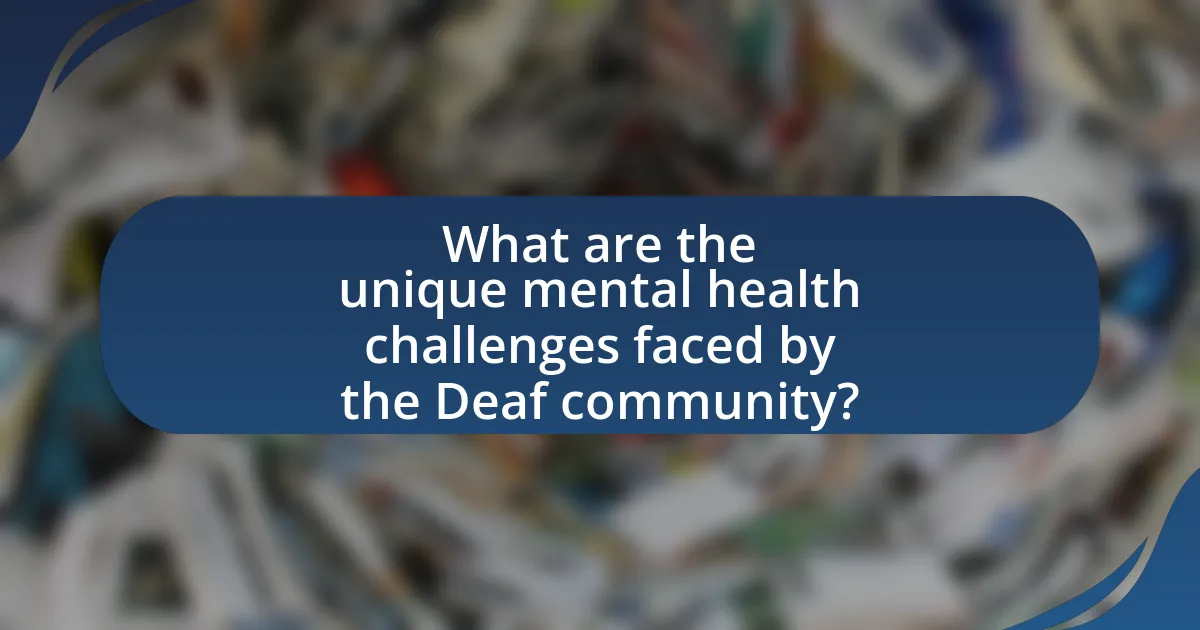
What are the unique mental health challenges faced by the Deaf community?
The Deaf community faces unique mental health challenges primarily due to communication barriers, social isolation, and stigma. Communication barriers can lead to misunderstandings in healthcare settings, resulting in inadequate mental health support. Social isolation often occurs because of limited access to social networks and community resources, which can exacerbate feelings of loneliness and depression. Additionally, stigma surrounding both deafness and mental health can prevent individuals from seeking help, leading to untreated mental health conditions. Research indicates that Deaf individuals are at a higher risk for anxiety and depression compared to hearing individuals, highlighting the need for tailored mental health services that consider their specific communication needs and cultural context.
How does communication access impact mental health in the Deaf community?
Communication access significantly impacts mental health in the Deaf community by influencing social inclusion and emotional well-being. Limited access to effective communication methods, such as sign language interpreters or captioning, can lead to feelings of isolation, frustration, and anxiety among Deaf individuals. Research indicates that Deaf individuals who experience barriers to communication are at a higher risk for mental health issues, including depression and social anxiety, due to the lack of meaningful interactions and support systems. For instance, a study published in the Journal of Deaf Studies and Deaf Education found that Deaf individuals with better communication access reported higher levels of life satisfaction and lower levels of psychological distress. This evidence underscores the critical role that communication access plays in fostering mental health and overall quality of life within the Deaf community.
What role does sign language play in mental health support?
Sign language plays a crucial role in mental health support for the Deaf community by facilitating effective communication between individuals and mental health professionals. This communication is essential for accurately expressing emotions, experiences, and needs, which are vital for proper diagnosis and treatment. Research indicates that Deaf individuals often face barriers in accessing mental health services due to a lack of qualified interpreters and culturally competent providers, leading to miscommunication and inadequate care. Studies, such as those conducted by the National Association of the Deaf, highlight that using sign language in therapy sessions significantly improves the therapeutic relationship and outcomes, as it allows for a more nuanced understanding of the individual’s mental health challenges.
How do barriers in communication affect diagnosis and treatment?
Barriers in communication significantly hinder accurate diagnosis and effective treatment in the Deaf community. These barriers can lead to misunderstandings between healthcare providers and Deaf individuals, resulting in misdiagnosis or delayed treatment. For instance, a study published in the Journal of Deaf Studies and Deaf Education found that inadequate communication access often leads to a lack of understanding of medical conditions and treatment options among Deaf patients. This lack of clarity can exacerbate mental health issues, as individuals may not receive appropriate care or support. Furthermore, the absence of qualified interpreters can prevent Deaf individuals from fully expressing their symptoms, which is crucial for accurate diagnosis and tailored treatment plans.
Why is cultural competence important in addressing mental health issues?
Cultural competence is crucial in addressing mental health issues because it enables mental health professionals to understand and respect the diverse backgrounds, values, and communication styles of individuals. This understanding fosters trust and rapport, which are essential for effective treatment. Research indicates that culturally competent care can lead to improved patient outcomes, as evidenced by a study published in the American Journal of Psychiatry, which found that culturally tailored interventions significantly enhanced engagement and satisfaction among minority populations. By integrating cultural competence into mental health practices, providers can better address the unique challenges faced by individuals within the Deaf community, ultimately leading to more effective and personalized care.
What cultural factors influence mental health perceptions in the Deaf community?
Cultural factors that influence mental health perceptions in the Deaf community include language, identity, and social stigma. The use of sign language fosters a unique cultural identity that shapes how mental health is understood and discussed. For instance, Deaf individuals may perceive mental health issues through the lens of their experiences with communication barriers and societal exclusion, which can lead to feelings of isolation. Additionally, the stigma surrounding mental health can be amplified within the Deaf community due to a lack of accessible resources and culturally competent mental health professionals. Research indicates that Deaf individuals often face challenges in accessing mental health services, which can further complicate their perceptions and experiences related to mental health (Humphries, 2013; McKee, 2018).
How can mental health professionals improve their understanding of Deaf culture?
Mental health professionals can improve their understanding of Deaf culture by engaging in comprehensive training programs that focus on Deaf history, language, and community values. Such training can include workshops led by Deaf individuals and organizations, which provide firsthand insights into the unique experiences and challenges faced by the Deaf community. Research indicates that culturally competent care significantly enhances therapeutic outcomes; for instance, a study published in the “American Journal of Public Health” highlights that culturally informed practices lead to better patient satisfaction and adherence to treatment. By actively participating in Deaf cultural events and fostering relationships with Deaf community members, mental health professionals can further deepen their understanding and build trust, ultimately improving the quality of care provided to Deaf clients.
What stigma exists around mental health in the Deaf community?
Stigma around mental health in the Deaf community includes perceptions that mental health issues are a sign of weakness or that Deaf individuals are less capable of understanding or expressing their emotions. This stigma is compounded by communication barriers, leading to feelings of isolation and misunderstanding. Research indicates that Deaf individuals often face unique challenges in accessing mental health services, which can perpetuate the stigma and discourage them from seeking help. For instance, a study published in the Journal of Deaf Studies and Deaf Education highlights that Deaf individuals frequently encounter a lack of culturally competent mental health professionals, further exacerbating the stigma surrounding mental health within this community.
How does stigma affect help-seeking behavior among Deaf individuals?
Stigma significantly hinders help-seeking behavior among Deaf individuals by fostering feelings of shame and isolation. Deaf individuals often face societal misconceptions about their abilities and mental health, leading to a reluctance to seek assistance due to fear of judgment or discrimination. Research indicates that 60% of Deaf individuals report feeling stigmatized when discussing mental health issues, which discourages them from accessing necessary services. This stigma can result in untreated mental health conditions, exacerbating their challenges and further alienating them from support systems.
What strategies can reduce stigma related to mental health issues?
Education and awareness campaigns can significantly reduce stigma related to mental health issues. These initiatives inform individuals about mental health conditions, dispelling myths and misconceptions that contribute to stigma. Research indicates that educational programs can lead to increased understanding and empathy towards those with mental health challenges, as evidenced by a study published in the Journal of Mental Health, which found that participants who underwent mental health education showed a 30% reduction in stigma-related attitudes. Additionally, promoting open conversations about mental health within communities fosters an environment of acceptance and support, further diminishing stigma.
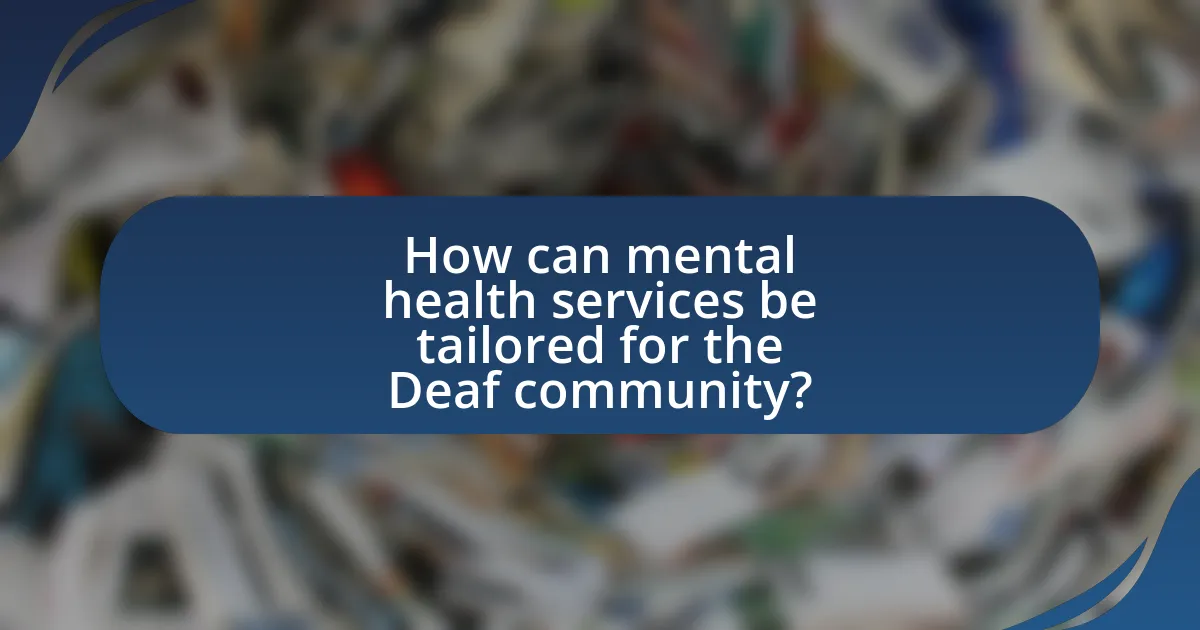
How can mental health services be tailored for the Deaf community?
Mental health services can be tailored for the Deaf community by ensuring accessibility through qualified interpreters, culturally competent providers, and the use of visual communication methods. Research indicates that Deaf individuals often face barriers in accessing mental health care due to communication challenges and a lack of understanding from providers about Deaf culture. For instance, a study published in the “American Journal of Public Health” by McKee et al. (2015) highlights that Deaf individuals report feeling misunderstood and marginalized in traditional healthcare settings. By incorporating sign language interpreters and training mental health professionals in Deaf culture, services can become more effective and inclusive, ultimately improving mental health outcomes for Deaf individuals.
What specific services are needed to support Deaf individuals with mental health issues?
Deaf individuals with mental health issues require specific services such as accessible mental health counseling, sign language interpreters, and culturally competent therapists. Accessible mental health counseling ensures that Deaf individuals can communicate effectively about their mental health needs, while sign language interpreters facilitate communication between Deaf clients and hearing professionals. Culturally competent therapists understand the unique experiences and challenges faced by Deaf individuals, which enhances the therapeutic relationship and treatment outcomes. Research indicates that tailored mental health services significantly improve the well-being of Deaf individuals, highlighting the necessity of these specific supports.
How can telehealth be effectively utilized for Deaf patients?
Telehealth can be effectively utilized for Deaf patients by incorporating sign language interpreters and providing accessible communication platforms. This approach ensures that Deaf patients can engage in therapy sessions and consultations without language barriers, which is crucial for effective mental health care. Research indicates that telehealth services that include video conferencing with sign language support significantly improve patient satisfaction and treatment outcomes for Deaf individuals, as they can communicate in their preferred language. Additionally, platforms designed with visual aids and text-based communication options further enhance accessibility, allowing Deaf patients to receive timely and appropriate mental health support.
What role do peer support groups play in mental health care for the Deaf community?
Peer support groups play a crucial role in mental health care for the Deaf community by providing a safe space for individuals to share experiences and receive emotional support from peers who understand their unique challenges. These groups facilitate communication in sign language, fostering a sense of belonging and reducing feelings of isolation, which are prevalent in the Deaf community. Research indicates that peer support can enhance coping strategies and improve overall mental well-being, as evidenced by studies showing that participants in peer support programs report lower levels of depression and anxiety. Additionally, peer support groups can help bridge gaps in access to professional mental health services, as they often provide resources and referrals to qualified practitioners familiar with Deaf culture.
How can training for mental health professionals be improved?
Training for mental health professionals can be improved by incorporating specialized education on the unique needs of the Deaf community. This includes integrating sign language proficiency and cultural competency into training programs, which enhances communication and understanding between professionals and Deaf clients. Research indicates that mental health outcomes improve when providers are culturally informed; for instance, a study published in the “American Journal of Public Health” found that culturally competent care leads to higher satisfaction and better adherence to treatment among minority populations. Therefore, enhancing training with these elements can significantly benefit mental health professionals working with Deaf individuals.
What skills should be prioritized in training programs for working with Deaf clients?
Training programs for working with Deaf clients should prioritize communication skills, particularly proficiency in sign language, as effective communication is essential for building trust and understanding. Additionally, cultural competency is crucial, as it enables professionals to respect and understand the unique experiences and challenges faced by the Deaf community. Research indicates that mental health professionals who are fluent in sign language and culturally aware can significantly improve therapeutic outcomes for Deaf clients, as highlighted in the study “Mental Health Services for Deaf Individuals: A Review of the Literature” by McGowan et al. (2019), which emphasizes the importance of tailored communication strategies in mental health care.
How can ongoing education ensure cultural competence in mental health care?
Ongoing education ensures cultural competence in mental health care by equipping professionals with the knowledge and skills necessary to understand and respect diverse cultural backgrounds. This education includes training on specific cultural practices, communication styles, and the unique challenges faced by various communities, such as the Deaf community. Research indicates that culturally competent care leads to improved patient outcomes, as it fosters trust and enhances the therapeutic relationship. For instance, a study published in the “American Journal of Public Health” found that culturally tailored interventions significantly increased engagement and satisfaction among minority populations in mental health services. Thus, ongoing education is essential for mental health professionals to provide effective and respectful care to all individuals, particularly those from diverse cultural backgrounds.
What resources are available for Deaf individuals seeking mental health support?
Deaf individuals seeking mental health support can access various resources tailored to their needs, including specialized counseling services, support groups, and online platforms. Organizations such as the National Association of the Deaf (NAD) provide information on mental health resources and advocate for accessible services. Additionally, the Deaf Wellness Center offers culturally competent therapy and resources specifically for Deaf individuals. Research indicates that Deaf individuals often face unique mental health challenges, making these tailored resources essential for effective support.
How can community organizations assist in providing mental health resources?
Community organizations can assist in providing mental health resources by offering tailored support services, educational programs, and advocacy efforts specifically designed for the Deaf community. These organizations can facilitate access to mental health professionals who are fluent in sign language, ensuring effective communication and understanding. For instance, studies indicate that culturally competent care significantly improves mental health outcomes; therefore, organizations that employ Deaf counselors or provide training for hearing professionals can bridge the gap in service delivery. Additionally, community organizations can host workshops and support groups that address unique challenges faced by Deaf individuals, fostering a sense of belonging and reducing stigma around mental health issues.
What online platforms offer mental health support tailored for the Deaf community?
Online platforms that offer mental health support tailored for the Deaf community include SignHealth, which provides mental health services specifically designed for Deaf individuals, and the National Deaf Therapy, which connects Deaf clients with licensed therapists fluent in sign language. These platforms address the unique communication needs and cultural considerations of the Deaf community, ensuring accessible and effective mental health care.
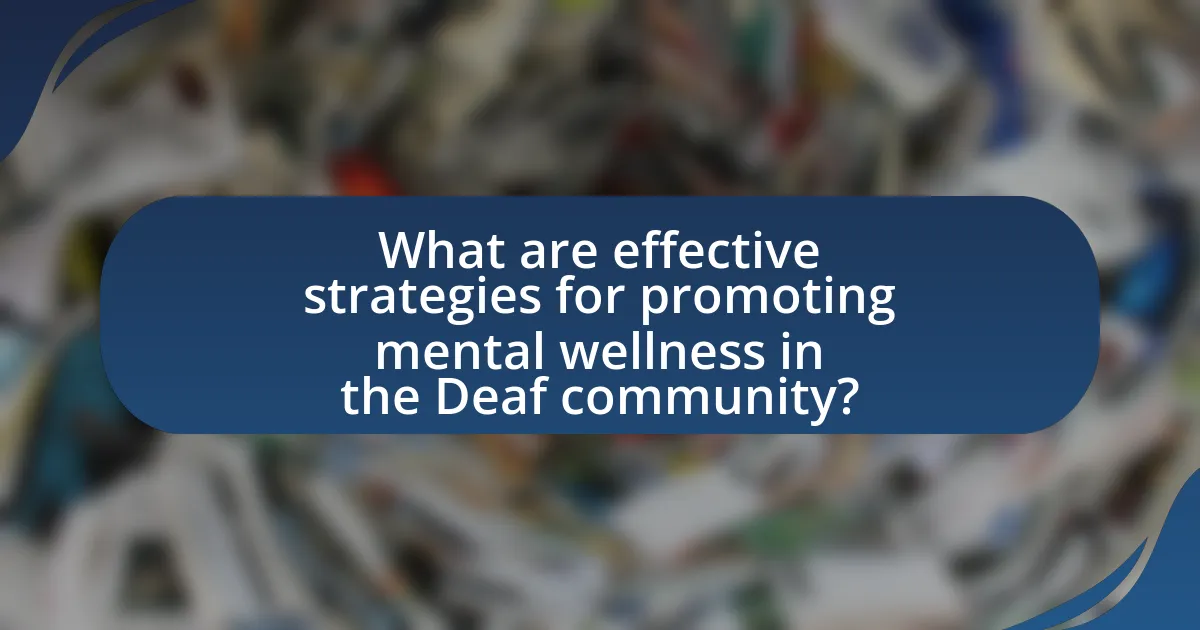
What are effective strategies for promoting mental wellness in the Deaf community?
Effective strategies for promoting mental wellness in the Deaf community include increasing access to culturally competent mental health services, fostering social connections through Deaf community organizations, and utilizing technology for mental health support. Access to culturally competent services is crucial, as research indicates that Deaf individuals often face barriers in traditional healthcare settings, leading to unmet mental health needs. Community organizations, such as the National Association of the Deaf, provide social support and resources that enhance feelings of belonging and reduce isolation, which is vital for mental wellness. Additionally, technology, including video relay services and mental health apps designed for Deaf users, can facilitate communication with mental health professionals, making support more accessible. These strategies collectively address the unique challenges faced by the Deaf community in accessing mental health resources.
How can awareness campaigns be designed to reach the Deaf community?
Awareness campaigns can be designed to reach the Deaf community by utilizing visual communication methods, such as sign language, captions, and visual aids. These methods ensure that the content is accessible and easily understood by Deaf individuals, who primarily rely on visual information. Research indicates that campaigns incorporating sign language interpreters and visual storytelling significantly enhance engagement and comprehension among Deaf audiences. For instance, a study published in the Journal of Deaf Studies and Deaf Education highlights that Deaf individuals respond more positively to materials presented in their native language, which is often sign language. Therefore, integrating these elements into awareness campaigns is essential for effectively addressing mental health issues within the Deaf community.
What messaging resonates most with Deaf individuals regarding mental health?
Messaging that resonates most with Deaf individuals regarding mental health emphasizes accessibility, community support, and the importance of culturally relevant resources. Deaf individuals often prefer mental health messaging that is delivered in sign language and incorporates Deaf culture, as this fosters a sense of belonging and understanding. Research indicates that when mental health resources are tailored to the Deaf community, including the use of visual aids and culturally competent professionals, engagement and effectiveness increase significantly. For instance, a study published in the “American Journal of Public Health” highlights that Deaf individuals are more likely to seek help when services are linguistically and culturally appropriate, demonstrating the critical role of tailored messaging in addressing their mental health needs.
How can visual media be utilized to promote mental health awareness?
Visual media can be utilized to promote mental health awareness by creating engaging content that resonates with diverse audiences, particularly within the Deaf community. For instance, videos featuring sign language interpreters can effectively communicate mental health messages, making them accessible to Deaf individuals. Research indicates that visual storytelling, such as animations or infographics, can enhance understanding and retention of mental health information, as visual elements are processed faster than text. A study published in the Journal of Deaf Studies and Deaf Education found that visual aids significantly improve comprehension of health-related topics among Deaf individuals. Therefore, leveraging visual media not only increases accessibility but also fosters a deeper connection to mental health awareness initiatives.
What role do families play in supporting mental health for Deaf individuals?
Families play a crucial role in supporting the mental health of Deaf individuals by providing emotional support, fostering communication, and promoting a sense of belonging. Emotional support from family members helps Deaf individuals navigate challenges related to their identity and experiences, which can significantly impact their mental well-being. Effective communication within families, especially through sign language, enhances understanding and reduces feelings of isolation. Research indicates that strong family connections can lead to better mental health outcomes, as families that engage in open dialogue about mental health issues create an environment where Deaf individuals feel safe to express their feelings and seek help when needed.
How can families be educated about mental health issues in the Deaf community?
Families can be educated about mental health issues in the Deaf community through targeted workshops and resources that focus on the unique challenges faced by Deaf individuals. These educational initiatives should include information on communication barriers, cultural considerations, and the prevalence of mental health disorders within the Deaf population, which studies indicate can be higher than in hearing populations due to factors such as social isolation and discrimination. For instance, research published in the “American Journal of Public Health” highlights that Deaf individuals experience higher rates of depression and anxiety, emphasizing the need for tailored mental health education for families. Additionally, involving Deaf mental health professionals in these educational efforts can enhance understanding and foster a supportive environment for both Deaf individuals and their families.
What support systems can be established for families of Deaf individuals with mental health challenges?
Support systems for families of Deaf individuals with mental health challenges can include specialized counseling services, peer support groups, and educational resources tailored to the Deaf community. Specialized counseling services, such as those provided by mental health professionals fluent in sign language, ensure effective communication and understanding of unique cultural contexts. Peer support groups offer a platform for families to share experiences and coping strategies, fostering a sense of community and reducing isolation. Educational resources, including workshops and informational materials in accessible formats, empower families with knowledge about mental health issues and available interventions. These systems are essential for addressing the specific needs of Deaf individuals and their families, as research indicates that culturally competent support significantly improves mental health outcomes within this community.
What practical tips can improve mental health outcomes for Deaf individuals?
Practical tips to improve mental health outcomes for Deaf individuals include fostering effective communication, promoting social connections, and ensuring access to mental health resources. Effective communication can be enhanced through the use of sign language interpreters and visual aids, which help convey information clearly and reduce misunderstandings. Promoting social connections involves creating inclusive environments where Deaf individuals can engage with peers, reducing feelings of isolation. Access to mental health resources is crucial; providing services that are culturally competent and accessible, such as therapists fluent in sign language, can significantly improve treatment outcomes. Research indicates that social support and effective communication are key factors in enhancing mental health for Deaf individuals, as highlighted in studies by the National Institute on Deafness and Other Communication Disorders.
How can Deaf individuals advocate for their mental health needs?
Deaf individuals can advocate for their mental health needs by actively seeking resources, utilizing support networks, and communicating their specific requirements to mental health professionals. Engaging with organizations that focus on Deaf mental health, such as the National Association of the Deaf, can provide access to tailored resources and support. Research indicates that Deaf individuals often face barriers in accessing mental health services due to communication challenges, which underscores the importance of advocating for accessible services that accommodate their needs. By participating in advocacy groups and sharing their experiences, Deaf individuals can raise awareness about the unique mental health challenges they face, thereby influencing policy changes and improving service delivery within the mental health system.
What self-care practices are particularly beneficial for the Deaf community?
Self-care practices particularly beneficial for the Deaf community include mindfulness meditation, visual art therapy, and community engagement activities. Mindfulness meditation helps reduce stress and anxiety, which are prevalent mental health issues within the Deaf community. Visual art therapy allows for self-expression and emotional processing without reliance on spoken language, fostering a sense of accomplishment and emotional release. Community engagement activities, such as social gatherings and support groups, enhance social connections and reduce feelings of isolation, which can significantly improve mental well-being. These practices are supported by research indicating that social support and creative expression are crucial for mental health in marginalized communities.
